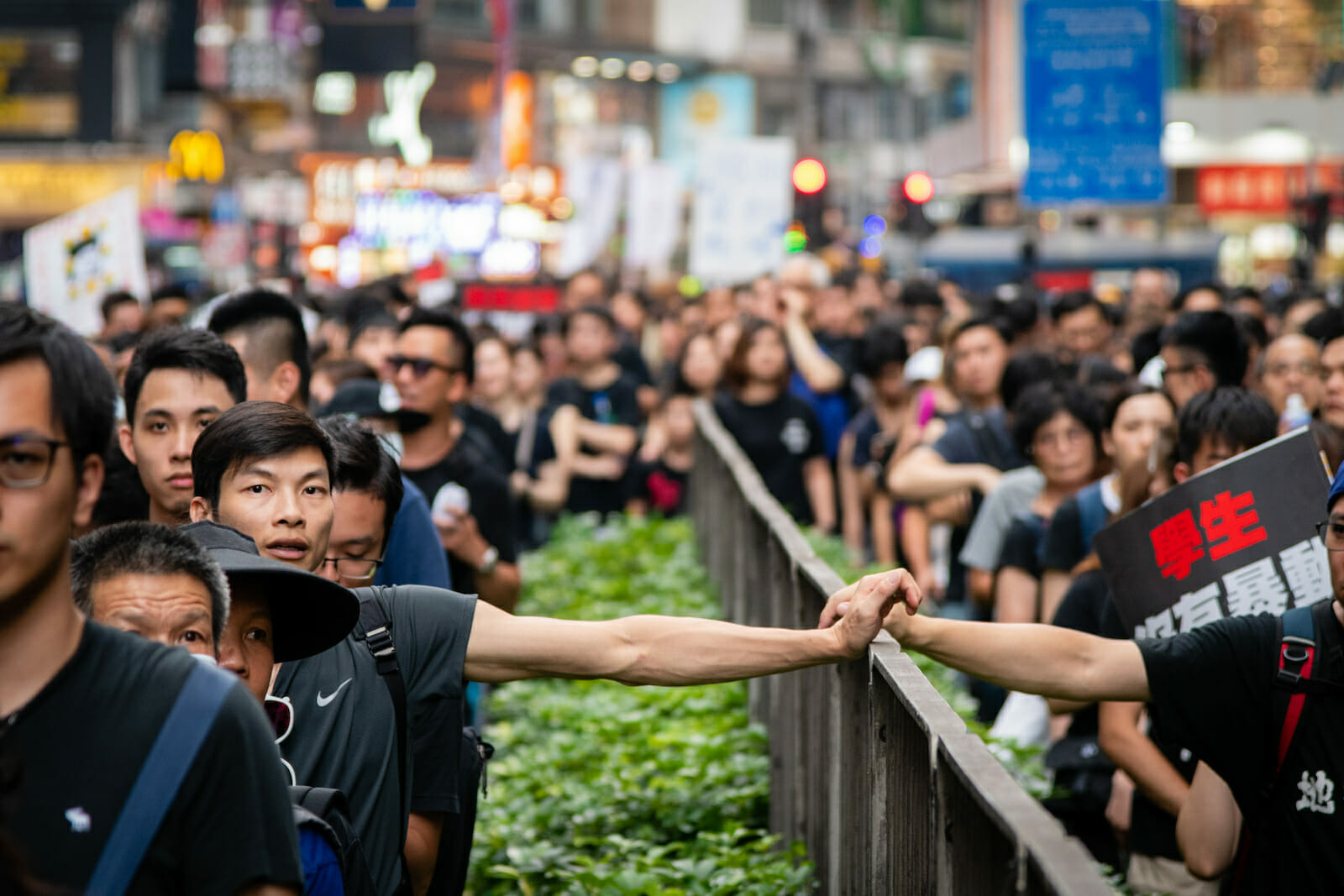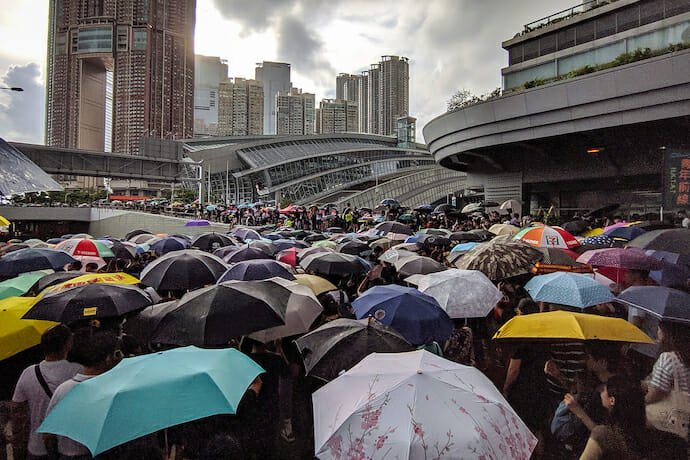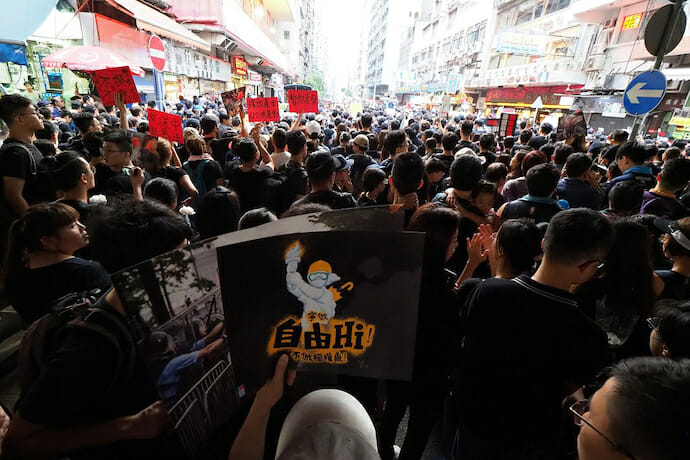
How Weeks of Protest are Taking a Toll on Hong Kong’s Economy
For the past 13 weeks, the Hong Kong government has faced a crippling crisis as protests against a now-shelved extradition bill evolved into an escalating movement against the Hong Kong government, China, and the police.
Protesters in Hong Kong are increasingly demanding their leaders to listen to their concerns and address Beijing’s growing influence in Hong Kong politics, arguing that the city was guaranteed a level of independence during its handover to China from Britain which is not being respected.
Over the past few months, the demonstrations have evolved from millions marching through the streets to groups of protesters in hard hats storming government buildings and shutting down the city’s international airport for two days.
The frequently violent rallies are having dire consequences on the city, famed as one of the world’s best business locations.
Taking a toll on Hong Kong’s economy
For two days, demonstrators took over the terminals at the Hong Kong International Airport, one of the world’s busiest, as part of their push for democratic reforms, crippling operations at the airport and forcing authorities to cancel all remaining flights out of the city.
The protests that shut down the international airport which led to the cancellation of almost 200 flights have since taken a toll on the economy of Hong Kong. Aviation experts estimate that Hong Kong suffered a $76 million hit from the cancellations.
Cancelled flights are terrible news for companies operating in the financial hub. More than 74 million passengers traveled to and from the airport last year. It handles 1,100 passenger and cargo flights each day and serves about 200 destinations around the world.
The airport contributes 5% to Hong Kong’s GDP, directly and indirectly, said Frank Chan, Hong Kong’s transport secretary, in May.
But experts worry that travelers will now avoid Hong Kong. Geoffrey Thomas, editor-in-chief and managing director of AirlineRatings.com, a website that monitors airlines, said the ongoing protests are a disaster for Hong Kong that will cost tens of millions of dollars.
Further toll
Apart from consequences on the airline sector, retail, and real estate sectors have seen their sales decline. The city’s public transit system has also been disrupted on multiple occasions, following the anti-government protests.
Two weeks ago, Hong Kong’s government lowered its 2019 GDP growth forecast to between 0% and 1%, from the original range of 2% to 3% as various sectors have reportedly been affected and markets are said to be hit hard.

Carrie Lam, Hong Kong’s chief executive, painted a bleak picture of the city’s worsening economy amid weeks of protests when she said: “The Hong Kong economy is facing the risk of downturn.” “We can see this from the data in the first half. Actually, I think the data in the first half has not fully reflected the seriousness of the problem.”
The three months to June were the weakest since 2009. Retail sales fell 6.7% in June and the tourist numbers crashed by 13% in the same month.
While mainland China is Hong Kong’s most important trading partner, the city is an international business and financial hub, and the economy is already showing signs of hurting as a result of the protests.
Companies have already reported “serious consequences from the disruption,” including lost revenue, disrupted supply chains and shelved investments, the American Chamber of Commerce in Hong Kong said last month.
Companies in Hong Kong, both international and local, have also faced pressure and accusations of acting in concert or sympathizing with the protesters. Cathay Pacific, Hong Kong’s flagship carrier and a major local employer, has been ordered by the Chinese aviation authorities to ban staff who take part in protests from traveling to China.
Last week, Hong Kong’s richest man, Li Ka-shing, and some of the cities biggest banks took out full-page adverts in local newspapers pleading with protesters to stop the rallies and marches.
Li, a billionaire whose conglomerate just bought the British brewer Greene King for £2.7 billion, pleaded for an end to the unrest “in the name of love” as the city was already showing the strains of an economic slowdown as a result of the growing trade war between China and the U.S.
The consultancy firm Capital Economics predicts a recession in the next quarter as visible signs of weakness emerge from the fog of protest.
Capital’s Julian Evans-Pritchard says “Retail sales are particularly badly affected and mainland tourism has fallen. Four percent of Hong Kong’s GDP is from tourism and 75% of tourists are from the mainland and they’ve stopped going because of the way the protests are portrayed there. We see this continuing deep into [the third quarter] with a technical recession – the first since the global financial crisis.”
Long-run cost
In addition to a drop in consumer spending on non-essential goods and the effects from canceled flights, there is an even greater impact in the long run which involves Hong Kong’s status as a hub for international companies seeking to do business in China or the region.
In 2018, it was discovered by the Hong Kong government that 1,530 multinational companies had established regional headquarters in the city. Of these, 290 were American.

Companies have historically chosen to set up shop in Hong Kong both because of its desirable location and its perception as a haven where the rule of law is strong, especially when compared with China.
That has been changing as more international companies opt to move their headquarters to the mainland as its economic power has grown.
What had been a trickle of companies leaving Hong Kong may well turn into a flood – and with it an exodus of high-paying jobs. Another long-term concern is how the Hong Kong demonstrations will affect China’s relations with the rest of the world.
Recall that U.S. President Donald Trump warned China that it must deal with the protests “humanely” if it wants to seal an agreement to end the trade war. Other world leaders may change the way they deal with China – and Hong Kong.
Where Hong Kong has always stood
Concerning trade, Hong Kong is a superpower. With a GDP bigger than many industrialized countries, the city has low taxes, abundant cheap labour, light regulation and is a world-class financial centre boasting a stock market with a total value of more than £2.5 trillion.
In the World Bank’s annual Doing Business rankings, the city places fourth and first in the world on the Heritage Foundation’s 2019 Index of Economic Freedom with most of the world’s major banks and multinational firms maintaining regional headquarters in the city.
If China seeks to resolve the protests by taking more control over Hong Kong – which would likely erode its attractive legal environment – multinational companies would have one less reason to keep the city as their regional foothold.
Hong Kong’s special status: Backing for protest
Hong Kong was a British colony for more than 150 years. When the British handed the city back to China in 1997, the two sides agreed that Hong Kong was to be governed as part of “one country, two systems” for 50 years. Hong Kong was granted a high degree of autonomy including having its own legal system and freedom of speech and assembly.
A policy dubbed “one country, two systems,” enshrines this uniqueness. Under this policy, Hong Kong’s maintains a de-facto constitution, known as the Hong Kong Basic Law which guarantees freedoms that are unavailable to Chinese mainlanders, such as the right to protest, the right to a free press and freedom of speech.
One of the tenets in the Basic Law is that Hong Kong has the right to develop its own democracy, and previous Chinese officials pledged that the central government in Beijing wouldn’t interfere with that. But in recent years, Beijing has repeatedly reinterpreted the Basic Law. Now it says it has “complete jurisdiction” over Hong Kong.
Over the years, critics of China in Hong Kong have accused Beijing of trying to integrate Hong Kong into China and in the process, destroy its unique identity. Some issues which became flashpoints included the detention of five Hong Kong booksellers who had published books that were unflattering of the Chinese leadership and an attempt to change the school curriculum in praise of China’s government.
Pro-democracy activists have also become more vociferous in their demands for democratic reforms, including the direct election of the chief executive. The chief executive is now elected by a 1,200-member pro-Beijing body.
How the protests started
Protests and acts of civil disobedience began in March when Hong Kong’s government mooted a controversial extradition bill that would have allowed the transfer of fugitives to several jurisdictions, including mainland China.
Opponents of the bill see it as a threat to the rule of law in the former British colony that would put Hong Kong at the mercy of China’s justice system and allow Beijing to have more direct control of the city. They believe that the Chinese legal system is not transparent and is used to target Beijing’s political opponents.
The protests reached a peak when millions marched on the streets for two weekends in June against the extradition bill, forcing Chief Executive Carrie Lam to declare that the proposed legislation was “dead” and indefinitely shelved.
The suspension of the bill infuriated protesters, who had wanted it to be scrapped completely. This drew them out to the streets in even greater numbers, and the demonstrations have increasingly descended into violence, with police firing tear gas and rubber bullets and protesters hurling bricks and bottles.
The protesters have vandalized the Legislative Council building and attacked police stations. What began as opposition to a controversial extradition bill has morphed into a broader movement to defend Hong Kong’s wider social and political freedoms. Reports show that more than 600 people have been arrested so far.
What are the protesters like?
Hong Kong’s summer of protest has seen all kinds, including massive peaceful marches, widespread strikes from different professional industries and smaller group actions that have ended with clashes and vandalism, including putting up a banner in the seat of government that read “There’s no rioters, there’s only tyranny.”
The breadth and depth of the protest make it particularly exceptional. Reports have shown how many shopkeepers, motorists and others have supported the protesters with handouts of water and even offers of financial assistance.
On August 18, protest organizers estimated that 1.7 million people turned out in the pouring rain to demonstrate. This would represent almost one-quarter of Hong Kong’s population. The demonstrators include both young and old, with a large mix of families.
A survey of the crowds showed that while about 60% were under 30, almost one-fifth were 45 or older. The survey was conducted by three local scholars: Professor Francis Lee Lap-fung, director of Chinese University’s School of Journalism and Communication, Edmund Cheng Wai, an assistant professor at Baptist University, and Samson Yuen Wai-hei of Lingnan University. They studied 6,600 questionnaires handed out at 12 anti-extradition protests between June 9 and August 4.
On the protest front lines, demonstrators have confronted police and been targeted by stick-wielding men in white, whom some accuse of collaborating with the government. After a female protester was injured in the eye during clashes with police who were trying to disperse crowds, protesters wore eye patches in reference to the woman’s injury at the airport on August 12.
What is the government saying?
Officials in both Hong Kong and Beijing are increasingly critical of the protests.
In one of the statements released, Hong Kong police denounced the “radical and violent acts by protestors” at the airport, and a government spokesperson described what happened at the airport as overstepping “the bottom line of a civilized society.”
In China, coverage of the protests has shifted from censorship to focus on clashes and disorder, with protesters labeled as “violent mobs” and “criminals.” Yang Guang, a spokesman for the Hong Kong and Macao Affairs Office, China’s top body in charge of affairs in the city, said the protests showed signs of terrorism and suggested that they were the real threat to rule of law.
In an interview with CNN, Max Baucus, former U.S. ambassador to China, described the challenge that protesters posed to China’s central government. He said, “If Beijing thinks they can just jam a solution down the protesters’ throats, that’s not going to work, and I think they know that and trying to figure a way out.”
“Don’t forget. China is very conservative. It’s hard for China to deal with matters like this — they are used to having their own way. This has been difficult for them. They’re not nimble. They don’t have a big diplomatic core like the United States does for example. This is tough for them.”

